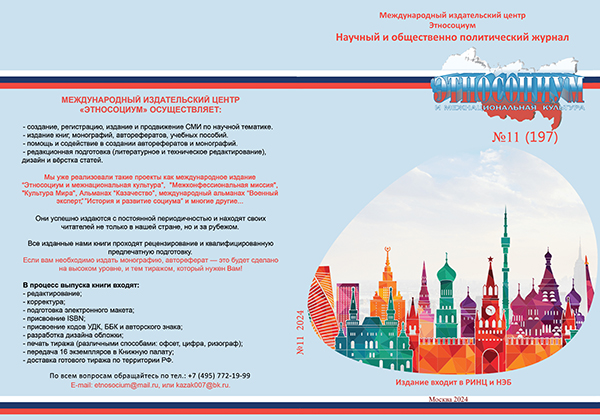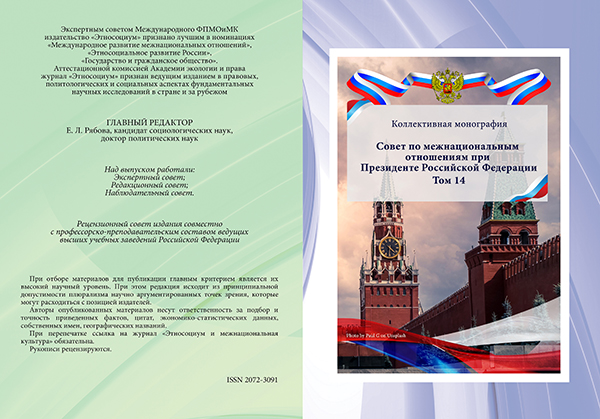

Content
|
COUNCIL ON INTERETHNIC RELATIONS UNDER THE PRESIDENT OF THE RUSSIAN FEDERATION
|
|
|
Baglieva A.Z. Ethnic and national in the spiritual life of the peoples of Dagestan
|
9
|
|
Baglieva A.Z. Arab-Muslim influence on the emergence and development of the spiritual culture of the peoples of Dagestan
|
15
|
|
REGIONAL RESEARCH
|
|
|
Logacheva E.A. Synergy of health and ecology: sustainable practices in student populations
|
25
|
|
CURRENT PROBLEMS OF MODERN SOCIETY
|
|
|
Ryabova E.L., Ternovaya L.O. Border symbols and borders of symbols
|
33
|
|
Mikhaylova N.V., Rashchibina J.M. Administrative, legal and political status of federal territories in the Russian Federation
|
43
|
|
Meshkova I.V. Personnel security as a direction of ensuring national security: federal and regional levels
|
54
|
|
Polyakov A.S. Intelligent monitoring systems for public services quality: new approaches to evaluating bureaucratic apparatus efficiency
|
64
|
|
INTERNATIONAL RELATIONS
|
|
|
Baranova Yu.V., Leonova A.A. The stratigical importance of Oceania for non-regional actors
|
72
|
|
Kopteleva O.A., Mandritsa A.V. Russia's Geopolitical interests in Central Asia: impact on the political situation in the region
|
81
|
|
ECONOMY
|
|
|
Filippov S.V. Features of commercial activity of transport companies
|
88
|
|
Chagarova A.A., Tekeeva H.E. Influence of digitalization of economy on bank system
|
93
|
|
Smakueva D.R., Tekeeva H.E. Digital economy challenges and prospects
|
99
|
|
Abstracts
|
106
|
|
Authors
|
117
|
|
Requirements to materials submitted to the international publishing house "Etnosocium"
|
119
|
The author in the article examines human nature from an anthropological, philosophical and humanitarian point of view, he reveals the essence of the categories "ethnic" and "national" by the example of the specifics and peculiarities of the national cultures of the Caucasian peoples, and, in particular, by the example of the unique polyethnic and polyconfessional nature of the spiritual culture of the Dagestan peoples.
Key words: spiritual culture, polyethnicity, polyconfessionalism, traditions, customs, national language, writing, Islam.
The paper deals with influence of Moslem culture on Dagestan spiritual sphere. Daghestan is a part of North Caucasus. Religion-related researches are of high important as facilitation of stability both in the region and the country.
Key words: Islam, spirituality, culture, heritage.
The article discusses the importance of integrating environmental and health-saving approaches into the educational process. The author emphasizes the necessity of forming a conscious attitude of students to the issues of ecology and health. The article presents a detailed subject of successful sustainable practices in the form of educational programs implemented in educational institutions, the main directions of their effectiveness are deduced. The aim of the study is to stimulate a dialog between students, teachers and university administrators to create a healthier and more sustainable student environment. The results of the work can be useful both for educational institutions and for organizations and enterprises dealing with environmental and health issues.
Key words: health, ecology, synergy of health and ecology, student environment, sustainable practices, educational programs, sustainable development goals.
The article is devoted to the problem of establishing various border signs. Any of them serves as convincing evidence that the symbolism of the border most clearly reflects the meanings referring to the image of the state itself, its history and culture. In addition, the evolution of border signs shows how the spirit of the place where they were installed changed over time. Also, with the help of border signs, the mechanism of the functioning of the state border is revealed both as a barrier and as a passage in it. Understanding the symbolism of the border allows us to imagine the features of the process of establishing the border of the symbol itself, the meaning of which goes far beyond geopolitical topics and helps to detect differences between adjacent spaces in any areas.
Key words: state border, history, symbol, sign, border demarcation, border post.
In this article topical issues and principles of formation of federal territories in the Russian Federation in the framework of modern public policy are considered. An analysis of the administrative and legal status of federal territories and their provisions in the political and administrative system of the modern Russian State is being conducted. The author of this article reveals the concept of federal territories on the basis of the conclusion of the Constitutional Court of the Russian Federation from 16.03.2020 N 1-3, given by the highest judicial body of the Russian Federation during the constitutional reform of 2020, as a result of which a new term «federal territories» was established in the text of the Basic Law of the Russian Federation. The lack of uniformity in the legal status of the federal territories and the reasons and principles for their conceptualization will be addressed.
The methodological basis of scientific research is presented by the following methods: formal-legal, analytical, comparative-legal, systemic, induction method.
Key words: federal territory, public policy, federalism, Constitution, subject of Federation, local self-government, power, state, Constitutional Court of the Russian Federation, Constitutional reform, law, policy.
The article examines the levels of personnel security as a component of the Russian national security system; describes the main personnel threats at the federal and regional levels and ways to minimize their negative impact. The necessity of ensuring the personnel security of state bodies as subjects of the implementation of the goals and objectives of the National Security Strategy of the Russian Federation is substantiated.
Key words: personnel security, national security, state body, state personnel policy, personnel risks, personnel threats.
This scientific research examines innovative methodologies for developing and implementing intelligent monitoring systems for public services quality as a tool for improving governance efficiency. The study focused on the application of artificial intelligence and machine learning methods to objectively evaluate the effectiveness of the bureaucratic apparatus and the quality of services provided to citizens. Key components of intelligent monitoring systems were analyzed, including data collection and processing, automated feedback analysis, predictive analytics, and the formation of dynamic performance indicators. Special attention was paid to the methodology of service quality assessment based on multi-factor analysis and innovative effect metrics. Practical recommendations were developed for implementing intelligent monitoring systems into the existing public administration infrastructure, and potential benefits of their application for optimizing management processes and increasing public satisfaction were described. The re-search results demonstrated significant potential for using intelligent technologies to transform traditional approaches to evaluating public administration effectiveness.
Key words: intelligent systems, public services, quality monitoring, management efficiency, bureaucratic apparatus, digital transformation, machine learning, administrative processes, predictive analytics, performance indicators.
This article examines the strategic importance of Oceania for extra-regional powers in the 21st century. It highlights the region's significance as a crucial node in international trade, analyzes the economic and geopolitical interests of external actors — primarily focused on the exploitation of natural resources within the islands' landmass and territorial waters, and the construction of military bases — and underscores the diplomatic support that Oceanian states provide to foreign powers in exchange for financial aid. The authors conclude that Oceania is becoming a stage for geopolitical competition, where economic, military, and diplomatic strategies of leading powers intersect.
Key words: Oceania, geopolitics, international relations, natural resources, rare earth metals, China, USA, France, diplomacy.
The article examines Russia's key geopolitical interests in Central Asia. Special attention is paid to the strategic importance of this region for the security and political stability of the Russian Federation. Central Asia acts as an important bridge between East and West, possessing rich natural resources and strategically important transport corridors, which makes it an object of active attention from Russia. The study of geopolitics highlights that Russia is seeking to strengthen its position in the region through various initiatives, including military cooperation. The author also analyzes the impact of Russian initiatives on the political situation in Central Asia, including issues of security, anti-terrorist cooperation and political integration, which in turn reflects broader geopolitical trends and challenges faced by Russia in this key region.
Key words: geopolitics, Central Asia, Russia, regional cooperation, strategic security, CSTO.
The specific features of commercial activity of transport enterprises are considered, the role of the transport industry in the economy is highlighted, the development goals and types of social responsibility of transport companies are highlighted, key market strategies are formulated.
Key words: market economy, commercial activity, transport company, social responsibility, market strategies.
Due to the rapid growth and development of the economy in the context of global digitalization, the improvement and introduction of new trends in the banking system was inevitable. Key aspects of the banking system and development of the banking sector, digital technologies, changes under their influence of business processes, banking products and services are considered to identify positive and possibly negative factors of the impact of the civilization of the economy on the BS.
Key words: banking system, digitalization of economy, banking sector, banking system development.
The use of the term "digital economy" is associated with the name of one of the world's leading experts in the field of the impact of technology on companies and enterprises, Don Tapscott, author of the book "Electronic-Digital Society", published in 1994. As D. Tapscott notes, the digital economy is an economic activity that, unlike the traditional economy, is determined by network consciousness and dependence on virtual technologies.
Key words: analysis, problems, prospects, technologies, traditions, development.